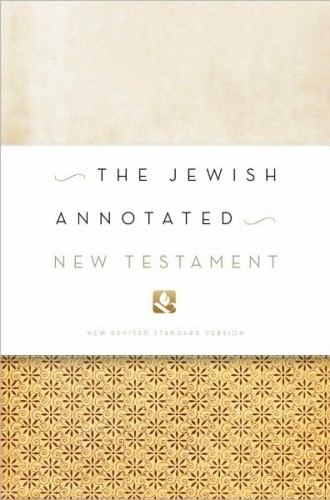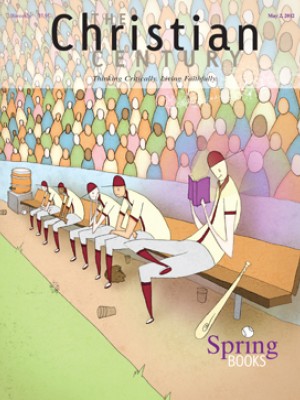The Jewish Annotated New Testament, edited by Amy-Jill Levine and Marc Zvi Brettler
One of the most interesting shifts in Christian theology after the Shoah was in how the adjective Jewish was used. In the patristic era, to call someone’s work Jewish was to insult it: the work was too fleshly or legalistic. Since the Shoah, to call someone’s work Jewish is to praise it as appropriately this-worldly, concerned with the ordinary stuff of life, embodied. This 180-degree turn in rhetoric is summed up nicely in an anecdote Stanley Hauerwas likes to use. A former colleague of his, a rabbi, used to say, “No religion is interesting that fails to tell its adherents what to do with their pots and pans and genitals.” How Jewish. In a 20th-century sort of way.
Now The Jewish Annotated New Testament is here to help us all be more Jewish. Amy-Jill Levine (author of The Misunderstood Jew) and Marc Brettler have edited and annotated a study Bible that will enable us to keep Jewish perspectives in mind as we read the New Testament. Using it to prepare for preaching and teaching lately, I’ve been shocked (again) at how easily my mind settles into the default mode of anti-Jewish interpretation: If Jesus turns up as a feminist, it must be because the Jews of his time were misogynists. If he likes children, it must be because the Jews of his time did not. This volume might get some of us Christians out of the habit of painting a negative portrait of Judaism in order to praise Jesus. If it does, it will have done the church and the world a mighty service.
Read our latest issue or browse back issues.
I am left with questions, however. Some have to do with the limitations of study Bibles as a genre. Levine and Brettler stuff a great deal of information into the margins of the NRSV text, but it often seems not nearly enough. They cite intertestamental and other Jewish texts that I have no knowledge of as though I do. Space clearly doesn’t allow for much more. Topical essays fill the gap to some degree, but not entirely.
I also often wonder whether the annotator is speaking as a Jew or as a critically trained New Testament scholar. One can be both at the same time, of course (praise God for an age in which we have so many who are both), but the notes often feel like boilerplate historical criticism, with its assumption of objectivity, rather than more full-throatedly and particularly Jewish commentary (note the positive valence!), with its assumption of immersion in the laws of Moses.
Are we who read the New Testament as scripture interested in this Bible because the God of Israel has, in Jesus Christ, elected even us gentiles? Or are we interested in it in order to become more tolerant of a diverse perspective? I find this volume far more interesting when approached from the former vantage point than from the latter.
In their preface the editors say they hope that preachers will not stain their preaching with “anti-Jewish stereotypes.” In one way this seems obvious: for Jesus to be Lord the Judaism that birthed him doesn’t have to be vilified. Yet even those of us convinced of the harm of binary logic often fall right back into it.
I think, for example, of sermons I’ve preached about Jesus being touched by the hemorrhaging woman in Mark 5 and about Jesus taking the hand of the dead girl—showing that compassion trumps purity. Levine’s essay “Common Errors Made about Early Judaism” shows that I was wrong in those sermons in several ways. Sure, the woman in Mark 5 is ritually impure, but Jesus doesn’t touch her, she touches him, and transfer of impurity doesn’t come from touching with hands. There is no prohibition against touching corpses—in fact, Jews take care of dead bodies, and there were prohibitions against neglecting them. Impurity is not necessarily sin, and it matters only if one wants to worship in the temple. There are still thousands of ways to preach Mark 5, but several sermons in the saddlebag are ruled out if one pays attention to Judaism both then and now.
Levine expertly dissects sophomoric sermons—I’ve preached them myself—on the supposed Jewish expectation of a militant messiah, on the burdensome yoke of the Torah, on supposed Jewish efforts to earn salvation by works. Wrong, wrong and wrong again. How do we preachers proclaim the good news without these crutches? That’s a hard question, and a worthwhile one for us to chew on.
In other cases the volume takes a scrappier attitude toward Christianity. An extended note from Shira Lander on 1 Corinthians flatly condemns the trinitarian thought in that epistle: “This passage [1 Cor. 15:28] illustrates Paul’s understanding that Christ (the messiah) is not God.” Of course, it does no such thing. The verse in question is a problem for trinitarian thought, but it is one that has been addressed, and in any case the leap from that one problematic verse to condemnation of trinitarian thought in Paul is a great one indeed. Nevertheless I’m grateful for Lander’s claim. Once we clear away millennia of misunderstanding, we can move toward a genuinely interesting disagreement.
On the other hand, the eminent scholar Daniel Boyarin shows in an essay on the Johannine Prologue that equating the Logos with God is a thoroughly unremarkable move for first-century Judaism. If there is a departure from Judaism in John 1, it is in the claim about incarnation in 1:14. I would have loved to hear Boyarin engage with Michael Wyschogrod’s claim that incarnation is thoroughly Jewish—that the elect people are God’s flesh in the world.
Some of the volume’s best moments are those in which editors disagree with one another (not directly, of course; for example, Lander is engaging Paul, and Boyarin is discussing John). Jewish interlocutors doing us the honor of reading our texts with critical depth can make us better Christians—if we survive the intellectual grilling.
Elsewhere the scrappiness simply hurts. Adele Reinhartz, in her introduction to John’s Gospel, claims that the text itself can be “considered ‘anti-Jewish’”—and it is hard to argue in view of verses like 8:44, “You are from your father the devil.” David Fox Sandmel comments on 1 Thessalonians 2:14–16 that because of these words, Paul is “inextricably associated with the promulgation of anti-Judaism, regardless of his intentions.” Of course, the texts are still scripture and must be read as such somehow (as the church has managed to do with texts like Psalm 137, for example). Sometimes the editors show us how. Gary Gilbert, commenting on Stephen’s martyrdom speech in Acts 7, points to Nehemiah 9 and Psalm 78 as places where a historical review of Israel’s unfaithfulness looks grim, but the people as a whole are not condemned.
Of course, Jews have often condemned Christians back. I was interested in some of the historical satires of the church that are recounted here, such as one claiming that Jesus was hanged on a cabbage plant. But these claims were not accompanied by political power as the church’s usually were. Martin Lockshin suggests that such anti-Christian works often survived because the church found them useful for its polemics against Jews.
This volume is an essential aid to preachers who want to traipse the contested ground where Israel-according-to-the-flesh and Israel-summoned-by-Jesus both seek to dwell. Christian theologians who want to praise Jesus as Israel’s messiah without displacing God’s people Israel will do well to read with care. Two warnings: your boilerplate sermons will need significant refreshment. And if you take up this volume, make sure you have abundant time. The wisdom, historical insight and charity offered here to the church will keep you reading longer than you planned.






